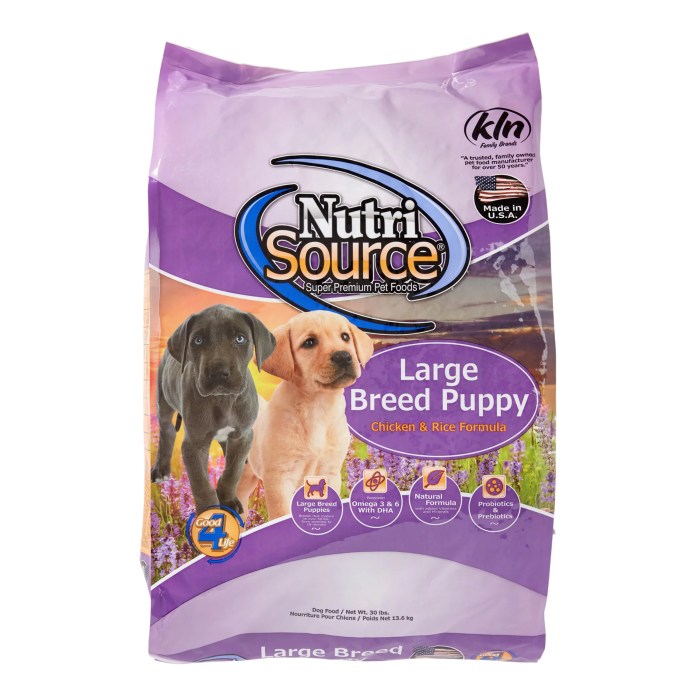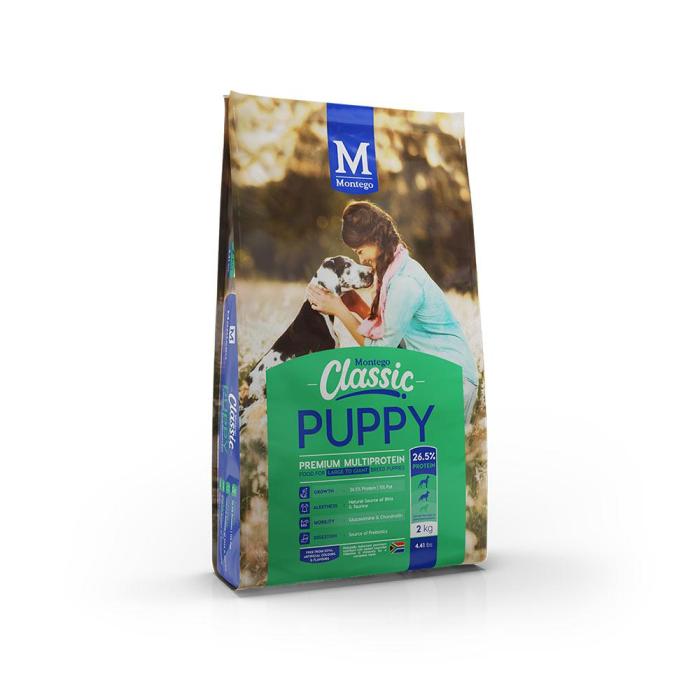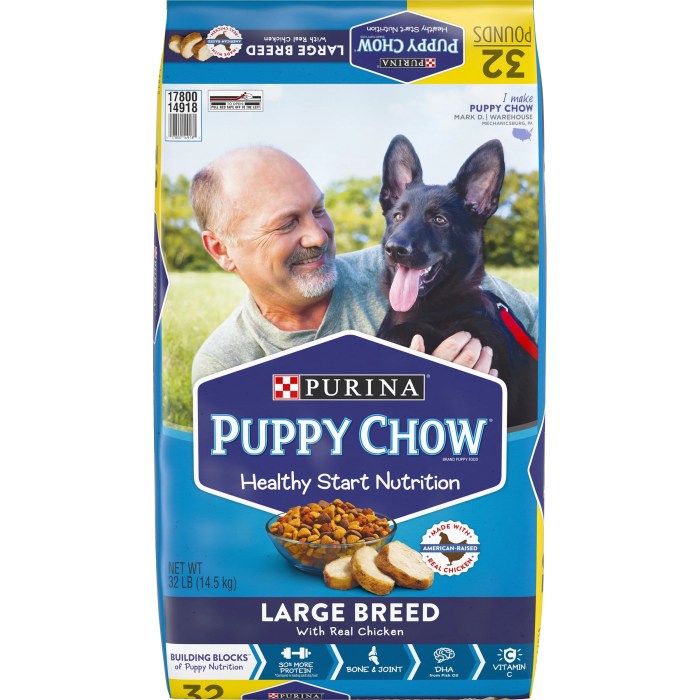Large breed puppy dog food takes center stage, a crucial component in nurturing the rapid growth and development of these majestic companions. From the moment they enter your life, large breed puppies require a specialized diet tailored to their unique needs, ensuring they thrive and reach their full potential.
Their larger frames demand a higher intake of protein and essential nutrients, supporting healthy bone and joint development. This guide delves into the intricate world of large breed puppy nutrition, providing insights into their specific dietary requirements, feeding guidelines, and tips for a thriving puppyhood.
Nutritional Needs of Large Breed Puppies

Large breed puppies have unique nutritional requirements compared to smaller breeds due to their rapid growth rate and skeletal development. These puppies need a higher calorie intake to support their growing bodies and a balanced diet to prevent health issues.
Essential Nutrients for Large Breed Puppies
The nutritional needs of large breed puppies are crucial for their healthy growth and development. A balanced diet should provide the right amount of essential nutrients, including:
- Protein: Protein is essential for muscle growth, tissue repair, and immune function. Large breed puppies need higher protein levels than smaller breeds to support their rapid growth. Aim for a diet with 25-30% protein, higher than the recommended 18-22% for small breed puppies.
- Fat: Fat provides energy, helps absorb essential vitamins, and supports brain development. Large breed puppies need a moderate amount of fat, around 15-20%, to support their high energy needs.
- Carbohydrates: Carbohydrates provide energy for activity and growth. Choose complex carbohydrates like whole grains and vegetables over simple sugars. The recommended carbohydrate content is around 40-50% of the diet.
- Vitamins: Vitamins are essential for various bodily functions, including bone health, immune function, and vision. Vitamin D is crucial for calcium absorption and bone growth, while vitamin E supports immune function and cell health. Ensure the diet contains a complete spectrum of vitamins.
- Minerals: Minerals are vital for bone development, muscle function, and overall health. Calcium and phosphorus are essential for bone growth, while magnesium supports muscle function and nerve transmission. The diet should include a balanced mineral profile to meet the puppy’s specific needs.
Importance of Balanced Nutrition for Large Breed Puppies
A balanced diet is crucial for large breed puppies as it helps prevent health issues associated with rapid growth.
- Skeletal Health: Large breed puppies are prone to bone and joint problems like hip dysplasia and elbow dysplasia. A diet rich in calcium and phosphorus, along with appropriate exercise, helps strengthen bones and prevent these issues.
An appropriate ratio of calcium to phosphorus is essential, usually 1.2:1 to 1.5:1.
- Growth Rate: Large breed puppies grow rapidly, and a balanced diet helps manage their growth rate and prevent skeletal problems. Feeding a diet formulated for large breeds helps ensure they receive the right amount of nutrients without overfeeding, which can lead to bone problems.
- Digestive Health: Large breed puppies have sensitive digestive systems, and a diet with high-quality ingredients helps support their digestion. Look for foods with easily digestible protein sources and prebiotics to promote healthy gut bacteria.
Growth and Development Considerations
Large breed puppies experience a rapid growth phase, making them prone to skeletal and joint issues. It’s crucial to understand the unique needs of these growing giants to ensure their healthy development.
Rapid Growth and Skeletal Health
Large breed puppies grow at an accelerated pace, putting immense pressure on their developing bones and joints. This rapid growth can lead to various skeletal issues, such as hip dysplasia, elbow dysplasia, and osteochondritis dissecans (OCD).
“Think of it like building a skyscraper – if you don’t have a strong foundation, the whole thing could crumble!”
Overfeeding and its Consequences
Overfeeding large breed puppies can have devastating consequences for their skeletal health. Excessive weight gain puts undue stress on their developing bones and joints, increasing the risk of orthopedic problems. It’s crucial to provide them with the right amount of food to support their growth without overloading their systems.
“Imagine a puppy trying to carry a backpack way too heavy for its size – that’s what overfeeding can do to their bones!”
Managing Weight Gain and Promoting Healthy Growth
To manage weight gain and promote healthy growth in large breed puppies, it’s essential to follow these tips:
- Feed a high-quality, large breed puppy food formulated for their specific needs. This ensures they receive the right balance of nutrients to support their growth and development.
- Follow the feeding guidelines on the food packaging. These guidelines are based on the puppy’s age, weight, and activity level.
- Avoid overfeeding. This means providing the recommended amount of food and not giving them extra treats or table scraps.
- Monitor their weight regularly. Use a scale to track their progress and ensure they maintain a healthy weight.
- Provide regular exercise. Daily walks and playtime are essential for promoting healthy growth and development. Avoid strenuous activities that could put stress on their joints.
- Consult with your veterinarian. They can provide personalized advice and monitor your puppy’s growth and development.
Choosing the Right Food
Choosing the right food for your large breed puppy is crucial for their healthy growth and development. It’s like choosing the right fuel for a race car – you want to give them the energy and nutrients they need to thrive.
Factors to Consider
There are a few key factors to consider when selecting food for your large breed puppy:
- Age: Puppies have different nutritional needs at different stages of their development. For example, a 6-week-old puppy will need a different diet than a 6-month-old puppy.
- Breed: Different breeds have different sizes and activity levels. For example, a Great Dane puppy will need a different diet than a Labrador Retriever puppy.
- Activity Level: Active puppies need more calories and protein than less active puppies.
- Dietary Sensitivities: Some puppies may have allergies or intolerances to certain ingredients, such as grains or protein sources. It’s important to choose a food that is suitable for their individual needs.
Types of Large Breed Puppy Food
There are three main types of large breed puppy food:
- Dry Kibble: This is the most common type of puppy food. It’s convenient, affordable, and easy to store. Dry kibble is also typically formulated with a higher calorie density, which can be beneficial for growing puppies. However, some puppies may find dry kibble difficult to digest or may not be as palatable as other options.
- Wet Food: Wet food is typically more palatable than dry kibble and can be a good option for picky eaters. It also contains a higher moisture content, which can be beneficial for puppies who are prone to dehydration. However, wet food is typically more expensive than dry kibble and can be messier to feed.
- Raw Food Diets: Raw food diets consist of raw meat, bones, and organs. They are often considered to be more natural and closer to a puppy’s ancestral diet. However, raw food diets can be more expensive and require more preparation. It’s also important to make sure that the food is properly handled and stored to prevent foodborne illness.
Large Breed Puppy Food Brands
Here is a table comparing some popular large breed puppy food brands:
| Brand | Key Features | Price Range |
|---|---|---|
| Purina Pro Plan Large Breed Puppy | Formulated with high-quality protein and glucosamine for joint health. | $25-$40 per bag |
| Royal Canin Large Breed Puppy | Tailored to the specific needs of large breed puppies, including controlled growth and joint support. | $30-$50 per bag |
| Hill’s Science Diet Large Breed Puppy | Contains antioxidants and prebiotics to support immune function and digestive health. | $20-$35 per bag |
| Eukanuba Large Breed Puppy | Formulated with 3D DentaDefense technology to help clean teeth and prevent plaque buildup. | $25-$40 per bag |
Feeding Guidelines and Portions: Large Breed Puppy Dog Food
Feeding your large breed puppy the right amount of food is crucial for their healthy growth and development. Just like humans, large breed puppies have different nutritional needs based on their age, weight, and activity level. Overfeeding can lead to obesity and joint problems, while underfeeding can hinder their growth and development.
Feeding Amounts
The amount of food your puppy needs will vary depending on their age, weight, and activity level. Here are some general guidelines:
- Puppies 8-12 weeks old: Feed 3-4 meals per day. The amount of food should be based on the puppy’s weight and breed-specific growth chart. You can find this information on the puppy food bag or by consulting with your veterinarian.
- Puppies 12-24 weeks old: Feed 2-3 meals per day. As your puppy grows, you can gradually reduce the number of meals per day. Again, the amount of food should be based on the puppy’s weight and breed-specific growth chart.
- Puppies 6-12 months old: Feed 1-2 meals per day. By this age, your puppy’s growth rate will have slowed down, so you can reduce the amount of food accordingly.
Monitoring Your Puppy’s Weight, Large breed puppy dog food
It’s important to monitor your puppy’s weight regularly. A healthy weight for a large breed puppy is one that allows you to feel their ribs easily without seeing them. If your puppy is overweight, you may need to reduce their food intake or switch to a lower-calorie diet.
Important: Always consult with your veterinarian to determine the appropriate feeding schedule and amount of food for your puppy.
Treats
Treats can be a great way to reward your puppy and strengthen your bond. However, it’s important to choose healthy treats and give them in moderation. Some healthy treat options include:
- Small pieces of cooked chicken or fish
- Raw vegetables like carrots, celery, and green beans
- Commercial treats specifically designed for large breed puppies
Important: Avoid giving your puppy table scraps or sugary treats, as these can be harmful to their health.
Feeding Frequency and Timing

Feeding a large breed puppy is a bit like managing a small, furry, and enthusiastic eating machine. Just like humans, they have different needs at different stages of their lives, and their eating habits are no exception. As your puppy grows, so does their appetite, and their feeding schedule needs to adapt accordingly.
Feeding Frequency for Large Breed Puppies
The number of meals a large breed puppy needs depends on their age. Puppies under 6 months old require more frequent meals due to their rapid growth and smaller stomach capacity. Here’s a general guideline:
* 8-12 weeks: 4 meals a day
* 3-6 months: 3 meals a day
* 6 months to 1 year: 2 meals a day
* Over 1 year: 1 meal a day
These are just guidelines, and you should always consult with your veterinarian to determine the best feeding schedule for your puppy.
Benefits of Multiple Small Meals
Large breed puppies, especially those with sensitive stomachs, often benefit from multiple small meals throughout the day. This is because:
* Smaller meals are easier to digest: Large meals can overwhelm a puppy’s digestive system, leading to indigestion, bloating, and discomfort.
* Reduces the risk of bloat: Bloat is a serious condition in large breed dogs, and multiple small meals can help reduce the risk by preventing the stomach from becoming too full.
* Provides consistent energy levels: Smaller, more frequent meals ensure a steady supply of energy for your puppy’s active growth and development.
Sample Feeding Schedule for a Large Breed Puppy
Here’s a sample feeding schedule for a large breed puppy from 8 weeks to 6 months old:
| Age | Feeding Frequency | Sample Feeding Times |
|---|---|---|
| 8-12 weeks | 4 meals a day | 7:00 AM, 11:00 AM, 3:00 PM, 7:00 PM |
| 3-6 months | 3 meals a day | 8:00 AM, 1:00 PM, 6:00 PM |
Remember, this is just a sample schedule. You should adjust the feeding times based on your puppy’s individual needs and activity levels.
Water Intake and Hydration
Water is essential for your large breed puppy’s health and well-being, just like how a good “teh tarik” is essential for a good “lepak” session. Providing constant access to fresh water is crucial for maintaining optimal hydration and preventing dehydration.
Importance of Water for Large Breed Puppies
Hydration plays a vital role in various bodily functions, including:
- Regulating body temperature
- Transporting nutrients and oxygen to cells
- Flushing out waste products
- Maintaining joint lubrication
- Supporting healthy digestion
Dehydration can lead to various health problems in puppies, including:
- Lethargy
- Loss of appetite
- Constipation
- Kidney problems
- Heatstroke
Encouraging Water Intake
Puppies, especially large breeds, may be reluctant to drink enough water. Here are some tips to encourage them to stay hydrated:
- Provide multiple water bowls in different locations, like a “pasar malam” with many stalls. This ensures easy access to water at all times.
- Use a large, wide bowl, especially for larger puppies. A small bowl can be challenging for them to drink from.
- Change the water frequently, at least twice a day. You wouldn’t want to drink “air teh” from a dirty glass, right?
- Add a few ice cubes to the water bowl, especially during hot weather. This can make the water more appealing and refreshing.
- Consider using a water fountain, which can encourage puppies to drink more, just like how a “kolam ikan” attracts fish.
- If your puppy is still reluctant to drink, consult your veterinarian. They can help you identify any underlying medical conditions that may be contributing to the problem.
Common Digestive Issues

Large breed puppies are prone to certain digestive issues, often due to their rapid growth and sensitive digestive systems. Understanding these problems, their causes, and how to manage them is crucial for ensuring your puppy’s health and well-being.
Bloating
Bloating, also known as gastric dilatation-volvulus (GDV), is a serious condition that can be life-threatening. It occurs when the stomach twists, trapping gas and causing the abdomen to swell.
- Causes: Bloating can be triggered by various factors, including eating large meals, rapid consumption of food, exercise immediately after eating, and genetics.
- Identifying Bloating: Signs of bloating include a distended abdomen, restlessness, drooling, retching, and difficulty breathing. If you suspect bloating, immediate veterinary attention is crucial.
- Managing Bloating: Preventing bloating is essential. This includes feeding smaller, more frequent meals, avoiding exercise directly after eating, and providing fresh water.
Diarrhea
Diarrhea is a common issue in puppies, often caused by dietary changes, infections, or parasites.
- Causes: Diarrhea can be caused by a variety of factors, including changes in diet, bacterial or viral infections, parasites, and stress.
- Identifying Diarrhea: Diarrhea is characterized by loose or watery stools, often accompanied by increased frequency of bowel movements.
- Managing Diarrhea: If your puppy has diarrhea, it’s important to monitor their hydration levels and consult with your veterinarian. They can recommend a bland diet and potentially prescribe medication.
Constipation
Constipation occurs when a puppy has difficulty passing stool, resulting in hard, dry feces.
- Causes: Constipation can be caused by a lack of fiber in the diet, dehydration, lack of exercise, and certain medical conditions.
- Identifying Constipation: Signs of constipation include straining to defecate, small, hard stools, and a decrease in bowel movement frequency.
- Managing Constipation: Increasing fiber intake through diet, providing adequate water, and encouraging exercise can help prevent and manage constipation.
Transitioning to Adult Food
As your large breed puppy grows into adulthood, it’s essential to switch them from puppy food to adult food. This transition ensures they receive the appropriate nutrients for their mature stage and helps prevent potential health problems.
Transitioning Gradually
Gradually transitioning your large breed dog from puppy food to adult food is crucial to avoid digestive upset. A sudden switch can cause diarrhea, vomiting, and other digestive issues.
- Start by mixing a small amount of adult food with their puppy food. Begin with a 25% ratio of adult food to 75% puppy food.
- Over the next few days, gradually increase the proportion of adult food while decreasing the amount of puppy food. Increase the ratio by 25% every 2-3 days.
- After about a week, your dog should be eating 100% adult food. Monitor their stool consistency and any signs of digestive upset during this period.
Choosing the Right Adult Food
Selecting the appropriate adult food for your large breed dog depends on their size, activity level, and any specific dietary needs.
- Size: Large breed dogs have different nutritional requirements than smaller breeds. Look for food formulated specifically for large breeds, as it contains the right balance of nutrients to support their growth and development.
- Activity Level: Highly active dogs need more calories and protein than less active dogs. Choose a food with a higher calorie content and protein level if your dog is very active.
- Dietary Needs: Some large breed dogs may have specific dietary needs, such as joint support or weight management. Consult your veterinarian to determine if your dog requires a specialized diet.
Feeding Guidelines and Portions
The feeding guidelines and portions for adult food will differ from puppy food. Follow the manufacturer’s recommendations on the food packaging, adjusting the amount based on your dog’s individual needs.
“It’s crucial to consult your veterinarian for personalized feeding recommendations, as they can assess your dog’s specific needs and adjust the feeding plan accordingly.”
Feeding Supplements
Just like humans, large breed puppies can benefit from certain supplements to support their growth and overall health. These supplements can address specific needs, such as joint health, gut health, and overall development. However, it’s crucial to consult with your veterinarian before introducing any supplements to your puppy’s diet, as they can interact with existing medications or have unintended consequences.
Joint Support Supplements
Large breed puppies are prone to joint issues due to their rapid growth and heavy frames. Joint support supplements can help minimize the risk of developing joint problems later in life.
- Glucosamine and Chondroitin: These are naturally occurring compounds found in cartilage that help maintain joint health. They are commonly used to support joint function and reduce inflammation.
- Hyaluronic Acid: This substance acts as a lubricant within joints, reducing friction and promoting smooth movement.
- Omega-3 Fatty Acids: These fatty acids, particularly EPA and DHA, have anti-inflammatory properties and can contribute to joint health.
Probiotics
Probiotics are live microorganisms that benefit the digestive system. They help maintain a healthy balance of bacteria in the gut, which is crucial for proper digestion and nutrient absorption.
- Improved Digestion: Probiotics can help break down food more effectively, reducing digestive discomfort and promoting regular bowel movements.
- Enhanced Immune System: A healthy gut microbiome supports a strong immune system, making puppies less susceptible to infections.
- Reduced Allergies: Some studies suggest that probiotics may help reduce the severity of allergies in puppies.
Omega-3 Fatty Acids
Omega-3 fatty acids are essential nutrients that play a vital role in brain development, vision, and overall health. They also have anti-inflammatory properties that can benefit joint health.
- Brain Development: Omega-3 fatty acids are crucial for brain development and cognitive function in puppies.
- Improved Vision: These fatty acids are essential for healthy vision development.
- Reduced Inflammation: Omega-3 fatty acids can help reduce inflammation throughout the body, including in joints.
Choosing Safe and Effective Supplements
When choosing supplements for your large breed puppy, it’s essential to prioritize safety and effectiveness. Here are some key considerations:
- Veterinarian Consultation: Always consult with your veterinarian before introducing any supplements to your puppy’s diet. They can recommend the right supplements based on your puppy’s specific needs and health history.
- Reputable Brands: Choose supplements from reputable brands that use high-quality ingredients and have been tested for safety and efficacy. Look for brands that have been third-party certified.
- Proper Dosage: Follow the dosage instructions provided by the manufacturer or your veterinarian carefully. Overdosing on supplements can be harmful to your puppy.
- Monitor for Side Effects: Keep an eye out for any adverse reactions to supplements, such as digestive upset, allergies, or behavioral changes. If you notice any side effects, stop giving the supplement and consult your veterinarian.
Feeding Tips and Tricks
Feeding a large breed puppy is a crucial aspect of their growth and development, and it requires more than just providing food. It involves understanding their nutritional needs, implementing proper feeding techniques, and creating an enjoyable mealtime experience.
Avoiding Free Feeding
Free feeding, where food is constantly available, can lead to overeating and weight gain in large breed puppies. This can put undue stress on their growing joints and bones.
- Instead, establish a structured feeding schedule, offering meals at specific times. This helps regulate their appetite and promotes healthy eating habits.
- Measure their food portions accurately using a measuring cup or scale. Overfeeding can lead to obesity, which can increase the risk of health issues.
Using Puzzle Feeders
Puzzle feeders are an excellent way to make mealtime more engaging and mentally stimulating for your puppy.
- These feeders require your puppy to work for their food, which helps slow down their eating pace and prevents them from gulping down their meals.
- They provide mental enrichment, keeping your puppy entertained and preventing boredom.
- Puzzle feeders are particularly beneficial for large breed puppies, as they can help manage their energy levels and prevent destructive behavior.
Managing Mealtime Behavior
Mealtime should be a positive experience for your puppy, but it’s important to establish good behavior from the start.
- Ensure a calm and quiet feeding environment, free from distractions. This helps your puppy focus on their meal and avoid anxiety.
- Avoid rushing your puppy during mealtimes. Let them eat at their own pace, and don’t interrupt them unnecessarily.
- If your puppy exhibits aggressive behavior during feeding, such as growling or snapping, consult with a veterinarian or certified dog trainer. They can help you address the underlying causes and develop appropriate training strategies.
Creative Mealtime Ideas
Making mealtime more enjoyable for your puppy doesn’t have to be complicated. Here are a few creative ideas:
- Hide their food in different places around the house, encouraging them to use their nose and search for their meals. This is a fun and stimulating activity that mimics their natural foraging instincts.
- Freeze their food in a Kong toy or a silicone ice cube tray. This creates a fun and challenging puzzle that keeps them entertained and satisfied.
- Add a few drops of low-sodium chicken or beef broth to their food. This adds flavor and moisture, making their meals more appealing.
Homemade Dog Food Supplement
Here’s a simple recipe for a homemade dog food supplement that can be added to your large breed puppy’s diet:
Ingredients:
* 1 cup cooked brown rice
* 1 cup cooked chicken or beef (diced)
* 1/2 cup chopped vegetables (carrots, broccoli, green beans)
* 1 tablespoon olive oil
* 1 egg (optional)
Instructions:
1. Combine all ingredients in a blender or food processor and blend until smooth.
2. Store in an airtight container in the refrigerator for up to 3 days.
3. Add 1-2 tablespoons of the supplement to your puppy’s food daily.

